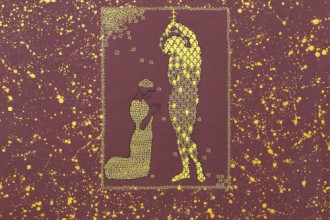By Daumoun Khakpour
Richard Ayoade’s The Double is an interesting exploration of surrealist cinema that takes more influence from literature then movies. A very straightforward film about a meek, unassuming office worker, Simon (Jesse Eisenberg), whose life unravels when his exact physical — yet supremely more confident — double, James, enters his world. While they start off as friends, with James helping Simon gain some confidence, their friendship slowly starts to erode, which in turn causes James to slowly sabotage Simon’s job, move in on Simon’s crush, Hannah (Mia Wasikowska), and turn everyone against him.
Although the title and basic premise of the film take simple plot elements from Dostoevsky’s short novel, ‘The Double’, it serves more as homage to Kafka’s surrealism or Orwellian dystopias. The society in The Double carries a hint of steam punk, authoritarian rule (“Big Brother†being replaced by “The Colonelâ€, who infests all facets of life), and a touch of bureaucratic unending hell. The cinematography absolutely helps sell this world — washed out dull greens and grays stretched over the screen, with some beautiful black and white contrast, while both the shot composition and lighting are gorgeous. Ayoade’s directing goes hand in hand with these visuals, including various tracking or handheld shots, static matte portraits that invade the characters own personal space, and multiple pans showing how small and suffocating the world is. The music is interesting, from Hitchcock-like suspenseful violin jabs to Korean Karaoke pop, all elements adding to a very unique and complexly pictured world.
However, even though the visuals and music helped sell the story, both the plot and character arc’s felt underdeveloped. The action climaxed too quickly, the ending being neither rewarding for the protagonist, nor fully realized , but rather there so the story could end. The film didn’t allow the lead lovers enough screen time to explore their relationship, leaving the viewer to wonder what had made them so special or worthy of the audience’s emotional investment in the first place.Much of the relationship relied on borrowing from various other love stories and transplanting those fragments within this narrative, hoping the audience will buy into this binding of homages.
The Double, while being surprisingly funny, and beautiful to look at and listen to, still needed to be developed further. James lacked the necessary depth, which made his actions at the end seem unrewarding and abrupt. Lastly, while I didn’t wish for a saccharine love plot brewing between the two leads, additional exposition could have been beneficial and helped tell their individual and collective stories better. But if you are a fan of Orwellian dystopias or Kafka surrealism, and mesmerising cinematography much like brooding noirs or most of Terry Gilliam’s work, The Double might be worth seeking out.
Daumoun Khakpour is a Contributing Editor for Film for the magazine.





